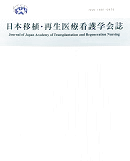Purpose: Liver transplant recipients who undergo transplantation at an early age transition from parental management for taking medications, visiting doctors, and managing their everyday lives to self-management as they grow and develop. However, during adolescence, the incidence of medication nonadherence and missed medical visits is high. Therefore, this study aimed to review the literature on scales useful for nurses to evaluate the state of transition from parental management to self-management in pediatric liver transplant recipients.
Methods: The keywords “Child,” “Liver Transplantation,” “Self-Management,” and “Self Care” were searched on Ichushi-Web, PubMed, CINAHL, and MEDLINE from January 1, 2010 to June 30, 2023, and seven references were selected.
Results: Although the measures included Allocation of Responsibility, the Responsibility and Familiarity with Illness Survey, Developmentally Based Healthcare Management Skills Checklist, the Healthcare Skills Checklist Tool, Global Assessment Measure, and Transition Readiness Survey: Adolescent/Young Adult Version, they were not used to evaluate recipients’ transitioning from parental management to self-management. Furthermore, this transition was considered in the international literature section as a part of transition from pediatric to adult care. Thus, these items in the scales were unsuitable for the current healthcare situation in Japan, where the transition from pediatric to adult care is scarcely discussed.
Conclusion: In the future, a scale to evaluate the transition from parental management to self-management of pediatric liver transplant recipients should be developed for Japanese nurses.
View full abstract
 2023 Volume 18 Pages 1-12
2023 Volume 18 Pages 1-12 2023 Volume 18 Pages 13-28
2023 Volume 18 Pages 13-28